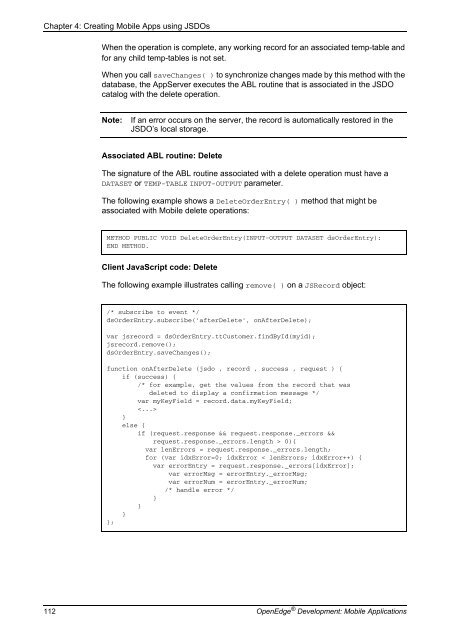OpenEdge Development: Mobile Applications - Product ...
OpenEdge Development: Mobile Applications - Product ...
OpenEdge Development: Mobile Applications - Product ...
Create successful ePaper yourself
Turn your PDF publications into a flip-book with our unique Google optimized e-Paper software.
Chapter 4: Creating <strong>Mobile</strong> Apps using JSDOs<br />
When the operation is complete, any working record for an associated temp-table and<br />
for any child temp-tables is not set.<br />
When you call saveChanges( ) to synchronize changes made by this method with the<br />
database, the AppServer executes the ABL routine that is associated in the JSDO<br />
catalog with the delete operation.<br />
Note: If an error occurs on the server, the record is automatically restored in the<br />
JSDO’s local storage.<br />
Associated ABL routine: Delete<br />
The signature of the ABL routine associated with a delete operation must have a<br />
DATASET or TEMP-TABLE INPUT-OUTPUT parameter.<br />
The following example shows a DeleteOrderEntry( ) method that might be<br />
associated with <strong>Mobile</strong> delete operations:<br />
METHOD PUBLIC VOID DeleteOrderEntry(INPUT-OUTPUT DATASET dsOrderEntry):<br />
END METHOD.<br />
Client JavaScript code: Delete<br />
The following example illustrates calling remove( ) on a JSRecord object:<br />
/* subscribe to event */<br />
dsOrderEntry.subscribe('afterDelete', onAfterDelete);<br />
var jsrecord = dsOrderEntry.ttCustomer.findById(myid);<br />
jsrecord.remove();<br />
dsOrderEntry.saveChanges();<br />
function onAfterDelete (jsdo , record , success , request ) {<br />
if (success) {<br />
/* for example, get the values from the record that was<br />
deleted to display a confirmation message */<br />
var myKeyField = record.data.myKeyField;<br />
<br />
}<br />
else {<br />
if (request.response && request.response._errors &&<br />
request.response._errors.length > 0){<br />
var lenErrors = request.response._errors.length;<br />
for (var idxError=0; idxError < lenErrors; idxError++) {<br />
var errorEntry = request.response._errors[idxError];<br />
var errorMsg = errorEntry._errorMsg;<br />
var errorNum = errorEntry._errorNum;<br />
/* handle error */<br />
}<br />
}<br />
}<br />
};<br />
112 <strong>OpenEdge</strong> ® <strong>Development</strong>: <strong>Mobile</strong> <strong>Applications</strong>
















